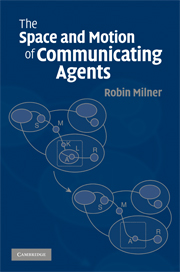10 - Behavioural theory for CCS
Published online by Cambridge University Press: 05 August 2012
Summary
In this chapter we shall see how our dynamic theory for a nice BRS can be applied to recover the standard dynamic theory of CCS.
Section 10.1 deals mainly with the translation of finite CCS into bigraphs, covering both syntactic structure and the basic features of reaction. It begins with a summary of all work done on CCS in previous chapters, in order to gather the whole application of bigraphs to CCS in one chapter. It then presents the translation into bigraphs, which encodes each structural congruence class of CCS into a single bigraph. It ends with the simple result that reaction as defined in CCS terms correponds exactly to reaction as defined by bigraphical rules.
Based upon this summary, Section 10.2 lays out the contextual transition system derived for finite CCS by the method of Chapter 8, recalling that its bisimilarity is guaranteed to be a congruence. This congruence is finer than the original bisimilarity of CCS. This is because the original is not preserved by substitution; on the other hand, our derived contextual TS contains transitions that observe the effect of substitution on an agent, and this yields a finer bisimilarity that is indeed a congruence. By omitting the substitutional transitions from the contextual TS, we then obtain a bisimilarity that coincides with the original.
This contextual TS is more complex than the original raw one, since its labels are parametric. But we are able to reduce it to a smaller faithful contextual TS whose labels are no longer parametric, and this corresponds almost exactly with the original raw TS for CCS.
- Type
- Chapter
- Information
- The Space and Motion of Communicating Agents , pp. 110 - 120Publisher: Cambridge University PressPrint publication year: 2009



